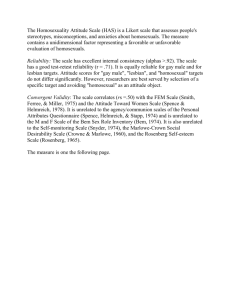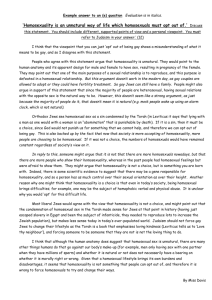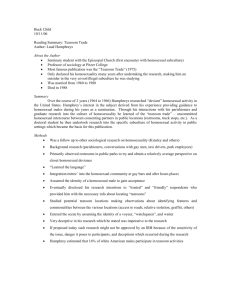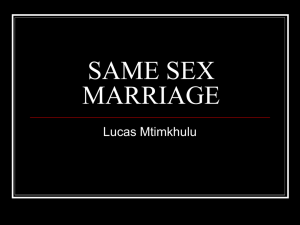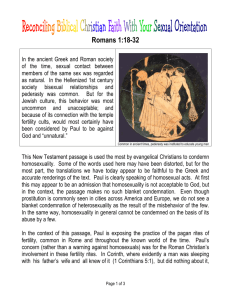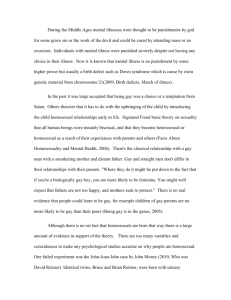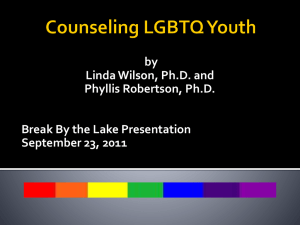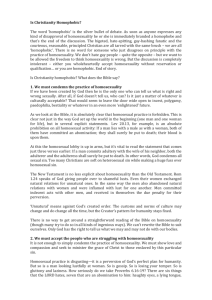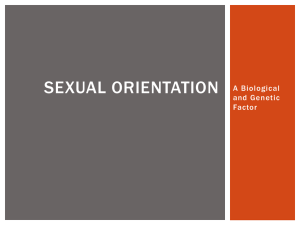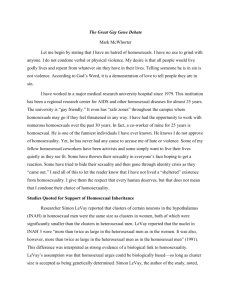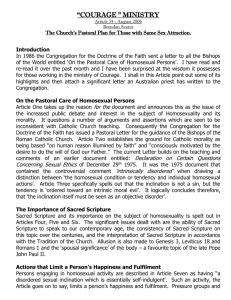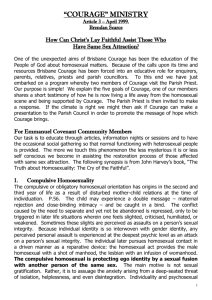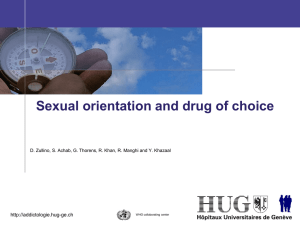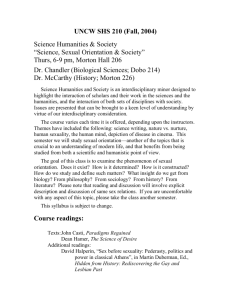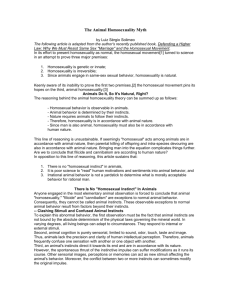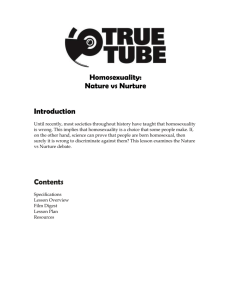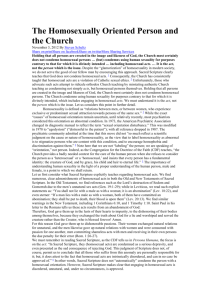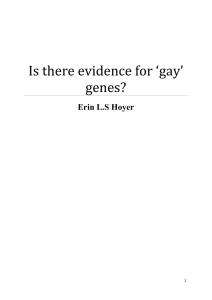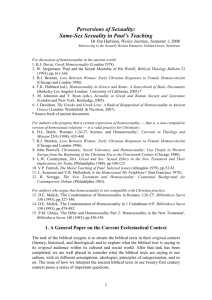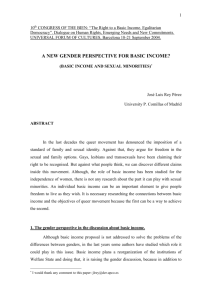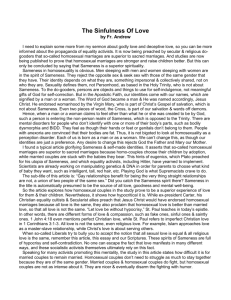Listen to Ex
advertisement
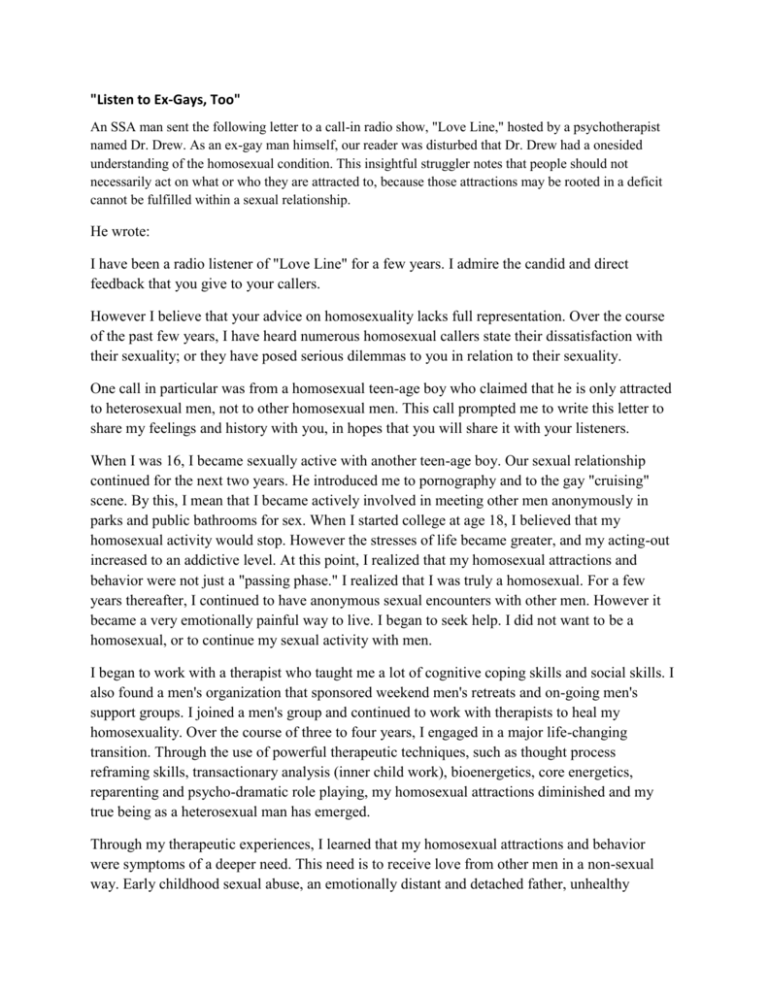
"Listen to Ex-Gays, Too" An SSA man sent the following letter to a call-in radio show, "Love Line," hosted by a psychotherapist named Dr. Drew. As an ex-gay man himself, our reader was disturbed that Dr. Drew had a onesided understanding of the homosexual condition. This insightful struggler notes that people should not necessarily act on what or who they are attracted to, because those attractions may be rooted in a deficit cannot be fulfilled within a sexual relationship. He wrote: I have been a radio listener of "Love Line" for a few years. I admire the candid and direct feedback that you give to your callers. However I believe that your advice on homosexuality lacks full representation. Over the course of the past few years, I have heard numerous homosexual callers state their dissatisfaction with their sexuality; or they have posed serious dilemmas to you in relation to their sexuality. One call in particular was from a homosexual teen-age boy who claimed that he is only attracted to heterosexual men, not to other homosexual men. This call prompted me to write this letter to share my feelings and history with you, in hopes that you will share it with your listeners. When I was 16, I became sexually active with another teen-age boy. Our sexual relationship continued for the next two years. He introduced me to pornography and to the gay "cruising" scene. By this, I mean that I became actively involved in meeting other men anonymously in parks and public bathrooms for sex. When I started college at age 18, I believed that my homosexual activity would stop. However the stresses of life became greater, and my acting-out increased to an addictive level. At this point, I realized that my homosexual attractions and behavior were not just a "passing phase." I realized that I was truly a homosexual. For a few years thereafter, I continued to have anonymous sexual encounters with other men. However it became a very emotionally painful way to live. I began to seek help. I did not want to be a homosexual, or to continue my sexual activity with men. I began to work with a therapist who taught me a lot of cognitive coping skills and social skills. I also found a men's organization that sponsored weekend men's retreats and on-going men's support groups. I joined a men's group and continued to work with therapists to heal my homosexuality. Over the course of three to four years, I engaged in a major life-changing transition. Through the use of powerful therapeutic techniques, such as thought process reframing skills, transactionary analysis (inner child work), bioenergetics, core energetics, reparenting and psycho-dramatic role playing, my homosexual attractions diminished and my true being as a heterosexual man has emerged. Through my therapeutic experiences, I learned that my homosexual attractions and behavior were symptoms of a deeper need. This need is to receive love from other men in a non-sexual way. Early childhood sexual abuse, an emotionally distant and detached father, unhealthy relationships with my mother and grandmothers and a feeling of non-acceptance from other boys and men all caused my homosexual attractions. Because I was wounded at such an early age, I shut down emotionally to protect myself. This kept out more pain from coming in, but it also kept me from receiving same-sex love that I so desperately needed. Through the course of my healing, I have received a lot of nonsexual touch from other men. This touch and my release of so much emotional pain has helped heal my wounds. I am now 26 and have been free from homosexual acting-out for three years. I am no longer sexually drawn to other men, and my previously non-existent heterosexual attractions have emerged. My urge to seek sexual change was based on my internal emotional pain, not societal pressures to "become straight." I tried living a gay lifestyle, and in my experience, it is unfulfilling and empty. The healing is not about suppressing the homosexual attractions. It is about embracing them for what they are, and for what they truly symbolize. I believe that homosexuality is a symptom (such as alcoholism or drug abuse) of deeper wounding. The very fact that 90% of gay couples are not monogamous, and that most gay men report early childhood sexual abuse, clearly states to me that homosexuality is inherently a developmental issue. There are too many environmental common denominators among homosexuals to conclude that the causes are random or biological. I have heard you make the connection between sexual abuse and later homosexual behavior in many of your callers. Acting on these homosexual attractions symbolizes an urge to connect with other men and to connect with masculinity. But two men who are looking for masculinity outside themselves cannot find it sexually through other men. In my judgment, that is why living in a gay relationship is ultimately unsuccessful. On certain occasions, I have heard you discuss how people should not necessarily act on what, or who, they are attracted to. Homosexuality is a great example. Homosexuals are searching for their gender identity through sexual contact with the same sex. However, they will not find it there. Because the roots of homosexuality are basically non-sexual needs, the homosexual cannot be healed through same-sex sexual relationships. It can be healed by deep, non-sexual bonding with people of the same sex. In reference to your ten-age homosexual caller who was not attracted to other homosexuals, it is clear to me that he is attracted to heterosexual men because of their masculinity, and that is precisely what he needs to connect with non-sexually. My intent is not to gay bash. I have much empathy for gay men and women. My hope is that more people will become aware that there is an option for those who are unhappy with their homosexuality and truly want to change. I realize that it is politically and professionally risky to talk about healing homosexuality. I respect that problem, and I respect the fact that some are happy being gay. Others, however, are not happy being gay. I sincerely hope that you will read this letter on the air during one of your shows. Because you have many listeners, your show is a great venue for discussion. Many of your listeners are at very impressionable ages, and they are turning to you for help. I encourage you to also present them with an alternative, and let them investigate what is best for their own hearts.
